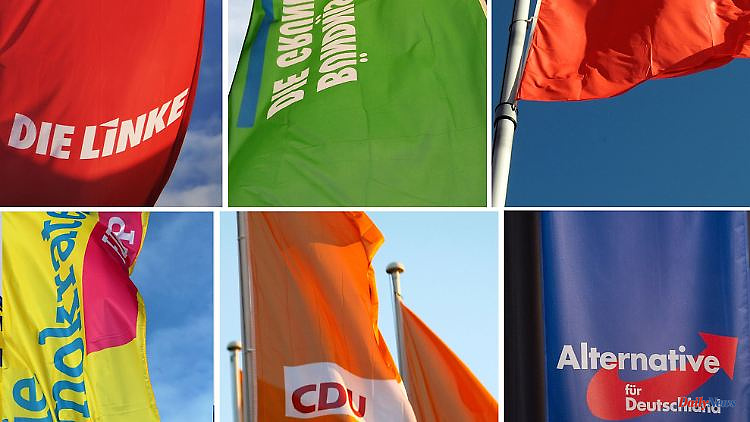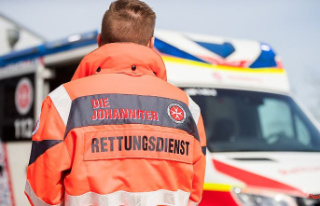The mainstream parties CDU and SPD in North Rhine-Westphalia continue to shrink. But the rise in the number of members of the Greens also seems to have stopped for the time being.
Düsseldorf (dpa / lnw) - The major parties CDU and SPD in North Rhine-Westphalia continue to lose thousands of members. The SPD NRW shrank by around 4,000 members in 2022 and still had around 91,000 members with party membership at the end of the year. At the end of 2022, the CDU still had 113,220 members - a loss of 2,780 members (down 2.4 percent) over the course of the year. The Christian Democrats are still the only party in the most populous state in North Rhine-Westphalia to have more than 100,000 members, while the SPD has long since slipped below this symbolically important mark. Growth slowed down for the much smaller, but accustomed to success, Greens.
According to the party, the decline in membership of the CDU has slowed down significantly compared to previous years. In the months after the state elections, which the CDU, headed by Prime Minister Hendrik Wüst, had clearly won, there was positive membership development. More people joined the CDU than left.
The designated general secretary of the CDU NRW, Paul Ziemiak, said: "The success in the state elections in May has also given our party work an impetus." His goal is to make the CDU NRW younger, more female and more diverse. The party also relies on modern, digital formats to strengthen the exchange among each other.
After their defeat in the state elections in May, the NRW-SPD wants to reposition itself in terms of content - "away from daily political small-small to a vision for 2027," said SPD Secretary General Nadja Lüders. She also sees social reasons for the bloodletting of the people's parties. "Like many large organizations, churches, newspapers or associations, the people's parties are also noticing that the demographics of the structure are currently having an impact and will continue to do so in the coming years." The member party of the future is different from the one 20 or 40 years ago. The federal SPD wants to recruit 30,000 new members nationwide by the end of 2023.
In the case of the Greens - government partner of the CDU in North Rhine-Westphalia since mid-2022 - growth seems to be slowing down further after the big leaps of the past few years. The number of members rose slightly over the course of the year by almost 400 to 26,316 in mid-December 2022. However, the number of Greens members in NRW has more than doubled since the election defeat of the Öko-Party in 2017.
"We are pleased that we have grown again as a party this year," said Political Director Raoul Roßbach. For a state association that now bears government responsibility, this is "not a matter of course - especially in challenging times". The Greens in the government had to take a lot of criticism from the base because of the decision to clear the lignite village of Lützerath, among other things.
The number of members of the FDP, which suffered heavy losses in the state elections in May and was kicked out of government, is stagnating. According to party information, the Liberals in North Rhine-Westphalia currently have just under 20,000 members. This roughly corresponds to the status at the end of 2021. However, the Free Democrats already had 20,200 members in NRW at the end of June. According to a spokesman, entries and exits were roughly balanced.
Overall, the FDP NRW has the highest number of members since the 1990s. "We are pleased that, even in politically difficult times, many people are committed to the Free Democrats," said Secretary General Moritz Körner.
According to the party, the number of members in the AfD NRW has exceeded the 5,000 mark. AfD country chief Martin Vincentz spoke of an "enormous response". Compared to 2021, significantly more membership applications have been submitted and new members admitted. They come from all ages and all social classes. The AfD had reached 5.4 percent in the state elections.
The NRW left, which was not elected to the state parliament again, had to cope with a wave of resignations in 2022. In mid-December 2022, the state association still had around 7780 members - almost 830 fewer than a year earlier (December 2021: 8609). Around 5,300 Linke members are men and around 2,480 women. Within a year, more than 1,150 members left the left and around 370 new ones joined. The exit wave has been flattening out since October.
The new state chairmen, Kathrin Vogler and Sascha H. Wagner, called the number of exits "frightening". The inner-party conflicts were the most common reasons for leaving. The good news is that the party is getting younger and younger. 59 percent of the members of Linke NRW are under 50 years old, more than a third (36 percent) is between 21 and 35 years old.












